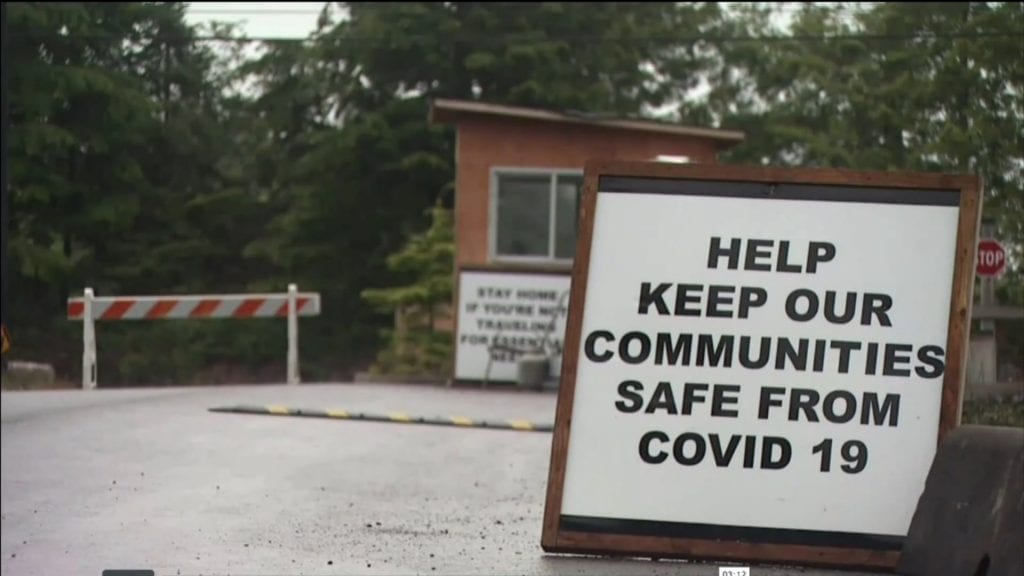
Sign warns visitors to a First Nation in B.C. APTN News file photo
Canada is preparing to receive its second shipment of COVID-19 vaccine – this time from Moderna Inc., which officials say is destined for remote and northern communities.
Health officials began administering the Pfizer/BioNTech vaccine to front-line healthcare workers and elderly citizens in the southern part of the country earlier this week.
The Moderna supply is “especially good news for remote locations where the demanding logistics requirements pose unique challenges for equitable access,” said Dr. Howard Njoo, Canada’ deputy chief public health officer.
In a briefing with reporters Wednesday morning, Njoo acknowledged some people were afraid of being innoculated.
But he offered this reassurance: “When Canada authorizes any vaccine, Canadians can be confident that the decision is the result of rigorous regulatory review for quality, safety and efficacy for which our country is widely recognized and respected,” he said.
Infectious disease
Njoo noted the vaccine offered protection against the infectious disease that has encircled the globe. But he said it was still being tested when it came to preventing transmission.
That’s why it was important to continue wearing face masks, washing hands with soap, and practicing social distancing after receiving the vaccine.
“These developments on the vaccine front, bring hope that we are on the road to ending the pandemic,” he said, “and we thank provincial and territorial governments, Indigenous leaders, industry and all the people of Canada for your ongoing collaboration and commitment to end COVID-19.”
Maj.-Gen. Danny Fortin told the briefing the Moderna vaccine, which can survive in regular freezers, would be distributed to the territories by the Canadian military.
The territories had to forego receiving the Pfizer vaccine, which has to be stored at -70 C, due to refrigeration concerns.
-20 C freezers
To address that, Fortin said “five -20C freezers were delivered by the Canadian Armed Forces to our territories” last weekend, Fortin said.
“These freezers will support the cold-chain requirements for the Moderna vaccine and build the capacity of territorial health organizations to immunize people within their jurisdiction.”
Moderna has agreed to supply Canada with up to 56 million doses. Once authorized by Health Canada, the vaccine can be delivered quickly, Fortin added.
That’s good news as the number of on-reserve cases of COVID-19 continues to spike.
Dr. Evan Adams, deputy chief medical officer with Indigenous Services Canada, said 6,390 cases were reported on First Nations as of Dec. 15 – with 2,472 being active.
‘Alarmingly high’
He said those were “alarmingly high numbers of Indigenous cases” in Alberta, Saskatchewan and Manitoba.
“To date 50 per cent of First Nations communities in Canada have experienced COVID…” Adams told the briefing.
“Sadly there have been 55 on reserve fatalities.”
Evans said the vaccine would be made available first to front-line healthcare workers, long-term care home workers and residents, seniors and Indigenous peoples.
“Vaccines will be delivered to northern communities and territories once it has received regulatory approval from Health Canada,” he added, “and a decision is expected soon.”
On the internet
Meanwhile, Health Canada is warning against buying COVID-19 vaccines sold on the internet.
It said online vaccines are counterfeit, may pose serious health risks, and are ineffective at protecting from the COVID-19 virus.
“Selling counterfeit drugs or vaccines is a criminal activity that poses serious risks to the health and safety of Canadians,” the department said in a release Wednesday.
“Health Canada takes this issue seriously and is working with international partners and other government departments and agencies, such as the Canada Border Services Agency, to help protect Canadians. The International Criminal Police Organization, INTERPOL, has issued a global alert to law enforcement across its 194 member countries warning them of this issue.”









